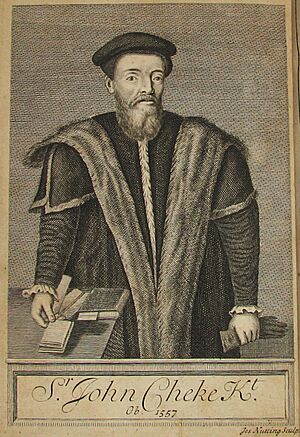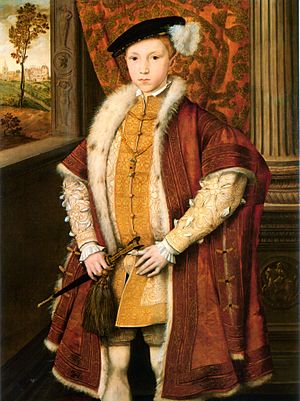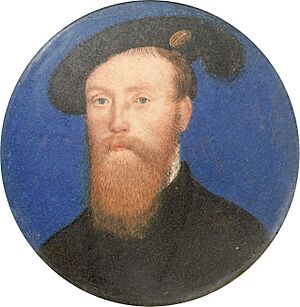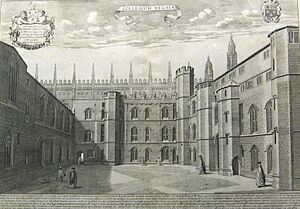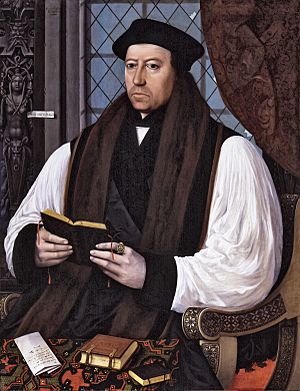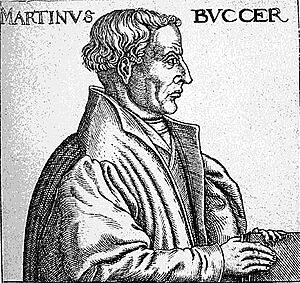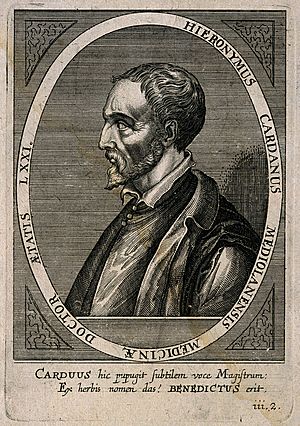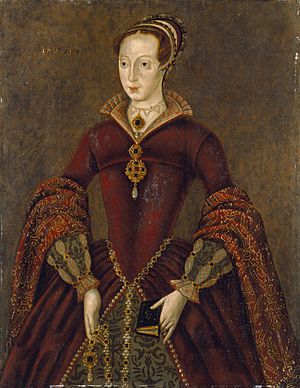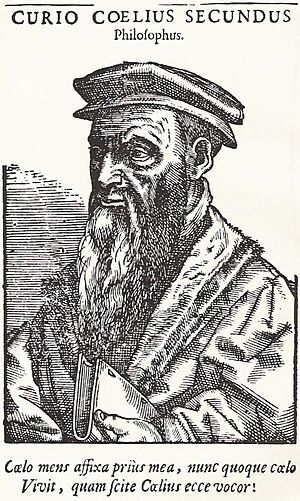John Cheke facts for kids
Sir John Cheke (born June 16, 1514 – died September 13, 1557) was an English scholar and important government official. He was one of the best teachers of his time. He became the first professor of Greek at the University of Cambridge. He played a big part in bringing back the study of Greek in England.
Sir John was a tutor to Prince Edward, who later became King Edward VI of England. He also sometimes taught Princess Elizabeth. He believed strongly in the Reformation, a movement to change the church. His career as a leader at King's College, Cambridge, a Member of Parliament, and briefly as a Secretary of State ended when Queen Mary came to power in 1553. He left England, but was captured in 1556. To avoid being executed for his beliefs, he changed his mind about his faith. He died soon after, and people said he regretted his choice.
Contents
Early Life and Learning
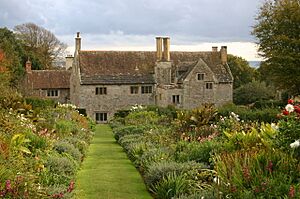
The Cheke family came from the Isle of Wight. John's father, Peter Cheke, worked at the University of Cambridge. John was born in Cambridge in 1514. He had five sisters.
John went to St John's College at Cambridge University. He earned his first degree in 1529 and became a Fellow, which meant he could teach there. He got his master's degree in 1533. His teacher was George Day.
John and his friend, Thomas Smith, were very talented students. King Henry VIII even gave them money to help with their studies. They were both inspired by John Redman, another scholar. Both their colleges supported new ideas from the Reformation, which John and Thomas liked.
Bringing Greek to Life
In the 1530s, John Cheke and Thomas Smith worked together. They wanted to fix how ancient Greek words were spoken. They believed that the old way of saying Greek words had become unclear. By changing the pronunciation, they made the language sound new and exciting. This helped people understand ancient Greek writings much better.
Thomas Smith started teaching Greek with this new pronunciation around 1535. Many students followed him. John Cheke and Thomas Smith began teaching students their new method. They even put on a play, Plutus by Aristophanes, using the new pronunciation. Even their former teacher, George Day, who became a bishop, tried to stop these changes. But John Cheke argued with him, and the new way of speaking Greek became popular.
In 1540, King Henry VIII created special teaching jobs called Regius Professorships. Thomas Smith became the Professor of Law, and John Cheke became the Professor of Greek.
Teaching a Future King
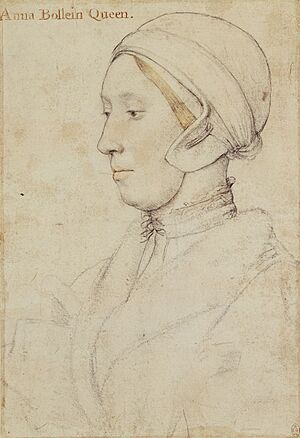
In 1544, John Cheke was chosen to be a tutor to Prince Edward, who would become King Edward VI of England. He taught the prince about languages, the Bible, and other important subjects. The young prince even wrote in his diary that Cheke taught him "of toungues, of the scripture, of philosophie and all liberal sciences."
John Cheke married Mary Hill in 1547. Her stepfather was Sir John Mason, an important diplomat. John Cheke's work as a scholar and his religious beliefs had a big impact. One writer, Gerard Langbaine, said that Cheke helped spread the new Protestant religion in England. He taught Prince Edward, and also made sure that Princess Elizabeth learned about these ideas too.
A Royal Advisor
When Edward became King, John Cheke was made a "Gentleman of the Privy Chamber." This was a special role close to the King. He also became a Member of Parliament for Bletchingley.
Challenges and Changes
John Cheke faced a challenge from Thomas Seymour, the King's uncle. Seymour tried to get Cheke to help him influence the young King. Cheke refused to do anything wrong, even though Seymour offered him money. King Edward listened to Cheke's advice and did not sign Seymour's letter.
In 1548, King Edward chose Cheke to be the head of King's College, Cambridge. Cheke also bought a lot of land, including the site of a former college.
After the Seymour incident, Cheke went back to Cambridge for a while. He focused on his books and adjusted to his new situation. Other teachers continued to instruct the King.
Religious Reforms and Rewards
In 1549, John Cheke helped lead a special visit to Cambridge University. They wanted to check and change old rules that were based on old Catholic beliefs. They held debates about important religious questions.
That same year, Cheke wrote an important book called The Hurt of Sedition. This book showed his strong support for King Edward's religious changes. He was also chosen to help write new laws for the Church.
Archbishop Cranmer, a very important religious leader, reportedly said that Cheke was lucky to have such a smart student as the King. Cranmer said the King "hathe more divinitie in his litle fynger, then all we have in al our bodies." Cheke also helped translate the first Book of Common Prayer into Latin.
In 1551, Cheke received more land and property for his hard work teaching the King. He was also made a knight, becoming Sir John Cheke. His brother-in-law, William Cecil, who later became a very important advisor to Queen Elizabeth, was also knighted that day.
Sir John Cheke took part in important discussions about the "Real Presence" in the Sacrament, a key religious topic. He also worked to build up the royal library. He acquired many valuable books and papers from his friends, including the scholar John Leland.
In 1552, Cheke became the Chamberlain of the King's Exchequer, a financial role. He also helped Archbishop Cranmer prepare the "Forty-two Articles" for the revised Prayer Book. These articles were important statements of Protestant belief.
During this time, a famous Italian scholar named Girolamo Cardano visited Cheke in London. Cardano wrote about Cheke, describing him as a slender, handsome man with sharp eyes.
A Secretary of State
In March 1553, Cheke was again elected to Parliament. In May 1553, he received more land and money for his service to the King. As King Edward's health grew worse, Cheke was sworn in as one of the main Secretaries of State on June 2, 1553. He joined the Privy Council, a group of the King's closest advisors.
The King died on July 6, 1553. Lady Jane Grey was proclaimed Queen on July 10. Sir John Cheke remained loyal to her as her Secretary of State. He wrote a letter to Mary, telling her that Jane was the rightful Queen.
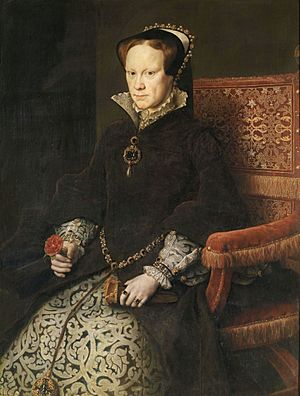
However, Mary gained more support, and she was proclaimed Queen on July 19. Sir John Cheke had to accept this change. He was arrested on July 27 or 28, 1553, and sent to the Tower of London. Charges were made against him.
After a period of imprisonment, Queen Mary showed mercy. Cheke was released from the Tower on September 13, 1553. He lost his position as head of King's College. His property was taken, but in the spring of 1554, he was allowed to leave England.
Life in Exile
In early 1554, Cheke traveled to Europe. He went to Strasbourg and then to Basel. There, he met Caelius Secundus Curio, another important scholar. Cheke explained his Greek pronunciation system to Curio.
By July 1554, Cheke was in Italy. He gave lectures on Greek in Padua to English students. He met many other scholars and important people. He continued to travel through Europe, visiting places like Augsburg and Strasbourg. In Strasbourg, he became a public professor of Greek.
In 1555, his letters with Bishop Gardiner about Greek pronunciation were published without his knowledge. This caused some trouble for Bishop Gardiner. Cheke also helped publish other books that supported the Reformation.
In the spring of 1556, he went to Brussels to meet his wife and other important people. On his way back, between Brussels and Antwerp, he was captured on May 15, 1556. This was ordered by Philip II of Spain, Queen Mary's husband. He was brought back to England and imprisoned in the Tower of London.
Imprisonment and Death
While in the Tower, Cheke was visited by priests and a dean from St Paul's. He wrote to the Queen, saying he would obey her laws. However, Queen Mary demanded that he fully change his religious beliefs and publicly say so. Many other Protestants had recently been executed for their faith.
In September 1556, he wrote a statement to the Queen that she approved. He agreed to rejoin the Catholic Church. On October 4, 1556, he made his public statement.
The writer John Foxe wrote that after his recantation, Cheke was made to dine with Catholics. He was even made to sit where Protestant martyrs were condemned. Foxe said that this made Cheke feel so much regret that he died not long after. Foxe also said that Cheke's "fall although it was full of infirmitie, yet his rising again by repentaunce was greate, and his ende comfortable."
After he changed his beliefs, some of his lands were given back to him. He died on September 13, 1557, at the age of 43, in London. He was buried at St Alban, Wood Street.
His friend, Roger Ascham, remembered him as "My dearest frend, and best master that ever I had or heard in learning." Another writer, Thomas Wilson, praised Cheke as a great speaker. The historian John Gough Nichols called him "one of the most interesting personages of the century."
Family
- Henry Cheke (around 1548–1586) was Sir John's son. He traveled in Italy and became a Member of Parliament.
- Sir Thomas Cheke, Henry's son, also became a Member of Parliament.
- John Cheke (died 1580) was another son. He became a soldier and was killed in 1580 during a battle in Ireland. He had no children.
- Edward Cheke was also living when his father died, but he had no children.
Writings
Sir John Cheke wrote many books and translated others. Here are some of his works:
- Introductio Grammaticus (a grammar book)
- De Ludimagistrorum Officio (about the duty of teachers)
- De pronunciatione linguae Graecae (about Greek pronunciation)
- Corrections to works by Herodotus, Thucidides, Plato, Demosthenes, and Xenophon.
- Epitaphia (epitaphs)
- Panegyricum in nativitatem EDVARDI Principis (praise for Prince Edward's birth)
- Elegia de Aegrotatione et Obitu EDVARDI VI (elegy on Edward VI's sickness and death)
- De obitu Buceri (on the death of Bucer)
- The Hurt of Sedition (a book about rebellion)
He also translated many works from Greek into Latin, including:
- Plays by Euripides and Sophocles.
- Aristotle's De Anima (On the Soul).
- Speeches by Demosthenes.
- Plutarch's De Superstitione (On Superstition).
- Works by St John Chrysostom.
He also translated English works into Latin, such as:
- Thomas Cranmer's Liber de Sacramentis (Book of Sacraments).
Many of Cheke's writings are still in manuscript form, and some have been lost over time.
See also
 | George Robert Carruthers |
 | Patricia Bath |
 | Jan Ernst Matzeliger |
 | Alexander Miles |


